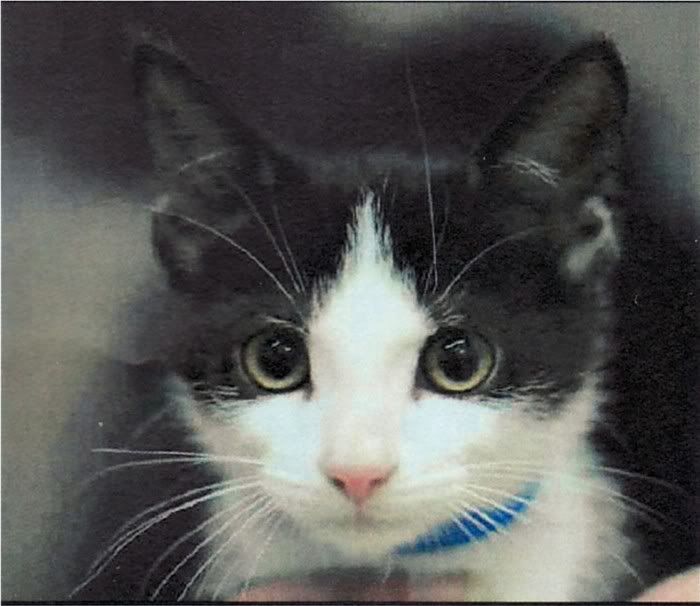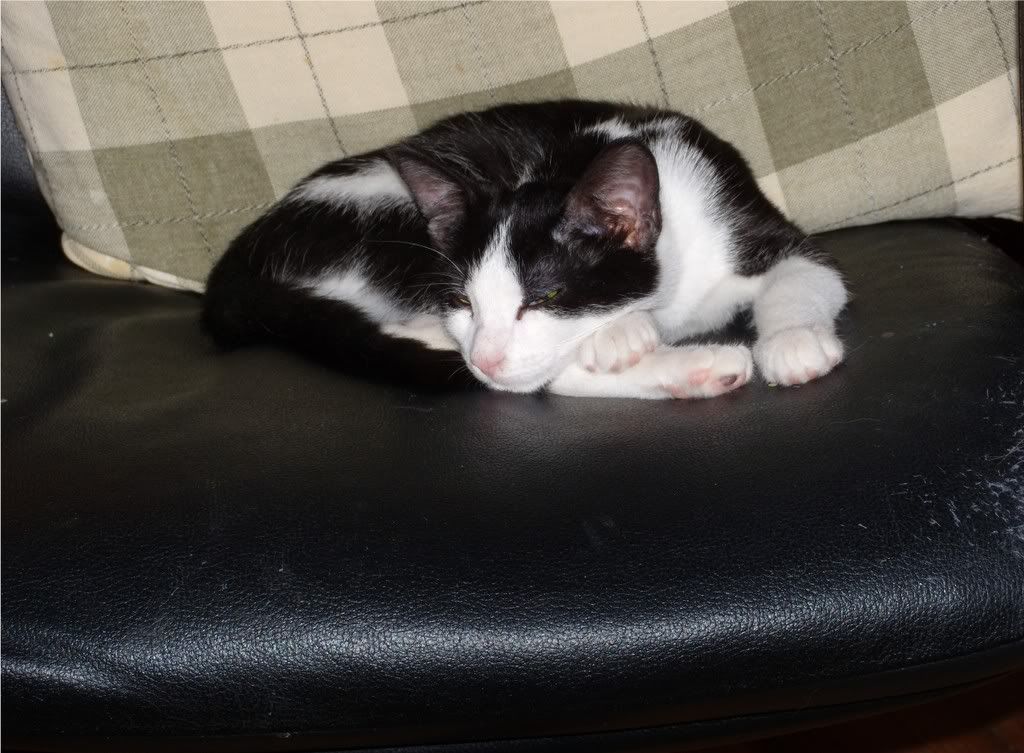
Matisse
This is the newest member of your blogger's family, back when he joined the household several months ago at the tender age of about six weeks.
It's no exaggeration to say that having a kitten in the house introduces a new dimension into one's life, even more than living with a grown cat. Perhaps it's like the experience of a new baby; I wouldn't know.
A kitten is a vision of what we imagine we might be like as pure souls, without being weighed down by cares and knowledge of life's dangers. Matisse demonstrates this at almost every moment. He is absolutely without fear. I don't know about the circumstances of his birth and nursing; we acquired him from an animal shelter where there is reason to think he was well taken care of. The first time I held him, tiny thing, he purred.
It's fascinating to watch how he is infinitely curious. Every object, every sound, commands his full attention -- at least, for a moment, till it's on to the next wonder. A person who has been blind from birth, and then gains sight through some advanced modern medical procedure, must look at the world this way. To see a kitten explore its environment is to get an inkling of what it would be like to wake up on the Day of Creation.
Matisse considers every surface a fit landing site for leaping onto, every opening an invitation to crawl inside. Never, it seems, having felt pain or reaping an unpleasant consequence from any act, he cannot imagine that Nature is there for anything other than his interest and enjoyment.
Is it better not to know of all life's potential suffering? Perhaps for a cat, an indoor cat like Matisse, who will always have a sheltered environment and be away from danger if I have anything to say about it. (Indirectly, I like to think keeping Matisse protected indoors is also doing a favor to whatever birds or other animals his instinctive, uncomprehending savagery could victimize.)
But -- assuming it were possible -- would such a life cushioned from all vulnerability, spared from sorrow and hurt, be good for members of our own species? Our fantasies would say yes.
According to Buddhist legend or history (take your pick), the Buddha began life as a prince, growing up carefree, knowing nothing of the ills of flesh and mind. When he did discover human suffering, it so shocked him that he could no longer live as a prince: he chose to undergo privation, danger, and wandering far from safety, for the sole purpose of understanding the meaning of suffering and the way out of it, for the perfection that no other animal than an enlightened human can know.
The Buddha, too, became fearless. Not through ignorance, but through knowledge of Truth.
I think kittens are here to be kittens. And we are here to be Buddhas.
It's no exaggeration to say that having a kitten in the house introduces a new dimension into one's life, even more than living with a grown cat. Perhaps it's like the experience of a new baby; I wouldn't know.
A kitten is a vision of what we imagine we might be like as pure souls, without being weighed down by cares and knowledge of life's dangers. Matisse demonstrates this at almost every moment. He is absolutely without fear. I don't know about the circumstances of his birth and nursing; we acquired him from an animal shelter where there is reason to think he was well taken care of. The first time I held him, tiny thing, he purred.
It's fascinating to watch how he is infinitely curious. Every object, every sound, commands his full attention -- at least, for a moment, till it's on to the next wonder. A person who has been blind from birth, and then gains sight through some advanced modern medical procedure, must look at the world this way. To see a kitten explore its environment is to get an inkling of what it would be like to wake up on the Day of Creation.
Matisse considers every surface a fit landing site for leaping onto, every opening an invitation to crawl inside. Never, it seems, having felt pain or reaping an unpleasant consequence from any act, he cannot imagine that Nature is there for anything other than his interest and enjoyment.
Is it better not to know of all life's potential suffering? Perhaps for a cat, an indoor cat like Matisse, who will always have a sheltered environment and be away from danger if I have anything to say about it. (Indirectly, I like to think keeping Matisse protected indoors is also doing a favor to whatever birds or other animals his instinctive, uncomprehending savagery could victimize.)
But -- assuming it were possible -- would such a life cushioned from all vulnerability, spared from sorrow and hurt, be good for members of our own species? Our fantasies would say yes.
According to Buddhist legend or history (take your pick), the Buddha began life as a prince, growing up carefree, knowing nothing of the ills of flesh and mind. When he did discover human suffering, it so shocked him that he could no longer live as a prince: he chose to undergo privation, danger, and wandering far from safety, for the sole purpose of understanding the meaning of suffering and the way out of it, for the perfection that no other animal than an enlightened human can know.
The Buddha, too, became fearless. Not through ignorance, but through knowledge of Truth.
I think kittens are here to be kittens. And we are here to be Buddhas.






No comments:
Post a Comment